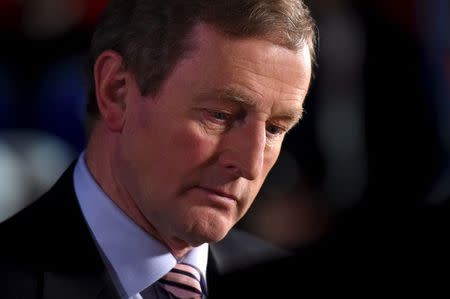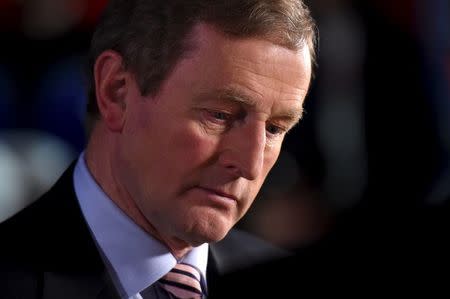Irish post-election stalemate persists, with no PM elected
By Padraic Halpin
DUBLIN (Reuters) - Enda Kenny lost a parliamentary vote to re-elect him as Irish prime minister on Thursday, as expected, and will assume the role in a caretaker capacity while his Fine Gael party attempts to form a new government.
Ireland has become one of several euro zone countries facing a prolonged political stalemate following its inconclusive parliamentary election on Feb. 26. Senior Irish ministers say it could take weeks to break the deadlock.
Kenny's centre-right party fell 29 seats short of the 79 needed for a parliamentary majority. Its historic rival Fianna Fail is the only viable partner to form a stable coalition but many in both parties are resisting such a tie-up.
"There are options open to us and it behoves us to examine all of those options in the interests of providing a working government that is going to last," Kenny told parliament before formally resigning and becoming caretaker prime minister.
Shortly after rejecting Kenny's re-election bid on Thursday, the Irish parliament also blocked an attempt by Micheal Martin, leader of the second biggest party Fianna Fail, to become prime minister.
Fine Gael and Fianna Fail, whose rivalry dates back almost a century to the country's civil war, have not discussed the prospect of any kind of alliance and have instead been trying to garner support from smaller parties and independent lawmakers.
Finance Minister Michael Noonan of Fine Gael said this week he presumed those talks would evolve into discussions with Fianna Fail once Thursday's vote was out of the way. Kenny has said he would be open to such negotiations.
Fine Gael argues that Ireland needs political stability to preserve and extend growth in the economy, which data on Thursday showed hit 7.8 percent last year, making it the best performer in Europe for a second successive year.
Analysts believe Ireland's economy can handle a degree of uncertainty and the yield on Irish 10-year bonds remains near record lows, aided by European Central Bank quantitative easing.
Kenny cited "the huge implications" of a possible exit by Britain from the European Union in a referendum in June as one of the challenges facing Ireland.
Fine Gael lawmakers have raised two main options for breaking the deadlock: a formal coalition with Fianna Fail or a minority Fine Gael government supported by its rival on a vote-by-vote basis.
If neither can be agreed, Ireland would face a second election.
Fianna Fail, which won just seven fewer seats than Fine Gael in the election, remains unconvinced about cutting any deal with its rival.
"We argued that the outgoing government should be replaced and that Fine Gael policy in particular had been divisive and unfair. This remains our position," Martin told parliament.
(Editing by Andrew Roche)





